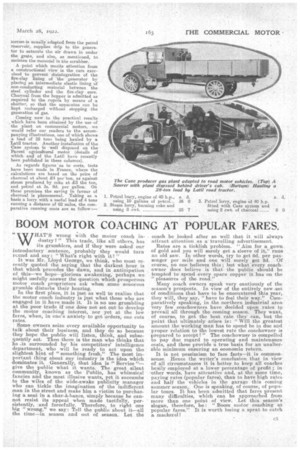BOOM MOTOR COACHING AT POPULAR FARES.
Page 13

If you've noticed an error in this article please click here to report it so we can fix it.
HAT'S wrong with the motor coach industry'? " This trade, like all others, has its grumblers, and if they were asked our introductory ' sentence, probably they would turn round and say; "What's right with it? " It was Mr. Lloyd George, we think, who most recently quoted the saying that the darkest hour is that which precedes the dawn, and in anticipation of this—we hope—glorious awakening, perhaps we might usefully answer the question which prosperous motor coach proprietors ask when some sonorous grumble disturbs their hearing.
In the first place, it is just as well to realize that the motor coach industry is just what those who are engaged in it have made it. It is no use grumbling at the poor trade if one does not set out to develop the motor coaching interest, nor yet at the low fares, when, in one's anxiety to get orders, one cuts rates.
Some owners seize every available opportunity to talk about their business, and they do so because they hope the publics will listen, think, and subsequently act. Then there is the man who thinks that he is surrounded by his competitors' intelligence department, who will be ready to act upon the slightest hint of "something fresh." The most important thing about any industry is the idea which dominates it. Generally, that idea is "Service "give the public what it wants. The great silent community, known as the Public, has whimsical fancies and the most illusive wants, yet it succumbs to the wiles of the wide-awake publicity manager who can tickle the imagination of the indifferent man in the street and make him a victim to purchasing a seat in a char-k-bancs, simply because he cannot resist its appeal when made tactfully, persistently, and forcefully. Therefore, to right one big "wrong," we say: Tell the public about it—all the time—in season and out of season. Let the
coach be looked after so well that it will always attract attention as a travelling advertisement.
Rates are a ticklish problem. "Aim for a gown of gold and you will surely get a sleeve of it," runs an old saw. In other words, try to get ad. per passenger per mile and one will surely get 2d. Of course, no one believes this' but what every coachowner does believe is that the public should be tempted to spend every spare copper it has on the " pleasures of the road." Many coach owners speak very oautiously of the season's prospects. In view of the entirely new -set of conditions that have to be encountered this year, they will, they say, "have to feel their way." Comparatively speaking, in the northern industrial area very few coachownere have decided upon rates to• prevail all through the coming season. They want, of course, to get the best rate they can, but the point that ultimately arises is: " Will the greatest amount the working man has to spend be in due and proper relation to the lowest rate the coachowner is prepared to accept? " The coachowner is compelled to pay due regard to operating and maintenance costs, and these provide a true basis for an unalterable minimum ensuring an economic return.
It is not pessimism to face facts—it is commonsense. Hence the writer's conclusion that in view of all circumstances it is better to keep all coaches busily employed at a lower percentage of profit ; in -other words, have attractive and, at the same time, paying rates (popular fares), than to have high rates and half the vehicles in the garage this coming summer season. One is speaking, of course, of popular tours. It has been admitted that fares present many difficulties, which can be approached from more than one point of view. Let this season's slogan, therefore, be: "Boom motor coaching at popular fares." It is worth losing a sprat to catch
a mackerel!
































